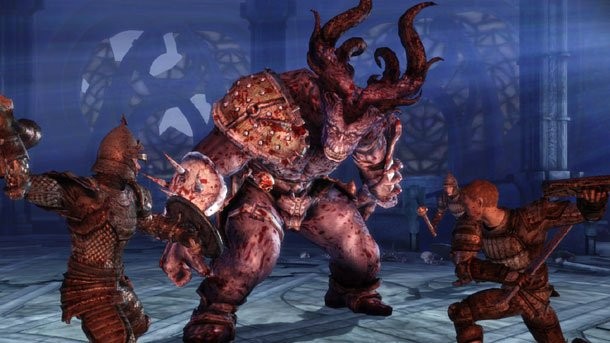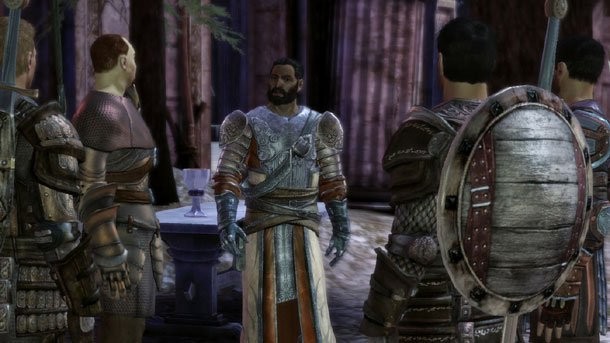Dragon Age: Origins Review

This is the strangest case of video game déjà vu I’ve ever experienced. After playing through the PC version of Dragon Age last month, I know these characters, I’ve seen these locations, and I’ve done these quests. In terms of content, everything in the console versions of BioWare’s epic fantasy RPG is practically identical to the PC release. On the other hand, the gameplay drastically changes the contours of the combat, creating a new landscape littered with familiar landmarks. By no means is it the same game, but it remains a great adventure.
When it isn’t being measured against the successes of its PC counterpart, this iteration of Dragon Age stands on its own as a mix of real-time battles and tactical combat. Instead of executing strategies using the classic pause-and-play approach (a hallmark of the Baldur’s Gate and Neverwinter Nights series), you spend most of your time in the trenches activating abilities and firing off spells in rapid succession. Pausing to issue commands is still available, but fights seem tailored to be action-oriented and less about considering your options – especially since the lack of an isometric view means that you rarely have a solid awareness of the whole battlefield.
Powers are mapped to the face buttons, which works particularly well for characters with a modest selection of skills, like fighters and rogues. You’ll wade into a group of enemies, use your powers, then attack normally until your cooldowns are ready to go again. If you plan on playing as a mage or carefully managing your ally mages, you should expect to pause combat regularly in order to select the most appropriate spell from the clunky menu system.
Battles have a more freewheeling style thanks to the shift away from pause-and-play, so you’ll want to be confident that your party members aren’t doing something stupid where you can’t see them. Constantly juggling control among your various allies throws a wrench in the otherwise smooth flow of combat, so I’d recommend spending lots of time with your AI scripting so your pals can fend for themselves. As an unexpected benefit, I felt more of a connection to my created characters since I spent more time controlling them directly rather than managing my party as a whole.
In streamlining combat for consoles, developers BioWare and Edge of Reality also dialed back the punishing difficulty. Fights that I won by the skin of my teeth in the PC version were a breeze this time around, largely because friendly fire is disabled on the normal difficulty setting. You can spew gouts of flame and conjure lightning storms with relative impunity, which removes all of the risk from casting high-level spells. I thought this was lame at first, but it isn’t without charm; I got lots of laughs using attacks and strategies that wouldn’t be viable if my allies were in harm’s way.
Tossing a fireball into a crowded melee is entertaining, but it represents the biggest problem with this incarnation of Dragon Age. The action-focused, low-pressure encounters are fun, but they rarely force you to truly test your skills. Though you’ll mow down hundreds of darkspawn and thugs, you’ll rarely feel the satisfaction that comes with a hard-won victory. Even the spoils of battle are a pain, since cramped inventory is a pervasive problem, and the only way to truly solve it is to shell out seven dollars for the Warden’s Keep DLC, adding a sorely needed storage chest for your excess items. This feature is a genre standard that should have been in the core package, and holding it back to make players buy it on launch day is pathetic.
Despite differences in the mechanics, the land of Ferelden is just as vast and intricate in the console versions of Dragon Age. The involved history behind the characters and organizations lends the world surprising depth, though technical hiccups (like an uneven framerate and occasional glitches) and an awkward interface can hamper your enjoyment of the content. Your dialogue and interaction options eschew the traditional good-versus-evil dynamic, instead embracing a more ambiguous view of morality. The story and its multiple branches will grab your attention, and the combat – while different in style – delivers plenty of thrills. I prefer the PC iteration, but it’s still good on PS3 and 360, and way better than not playing Dragon Age at all.


Get the Game Informer Print Edition!
Explore your favorite games in premium print format, delivered to your door.
- 10 issues per year
- Only $4.80 per issue
- Full digital magazine archive access
- Since 1991










